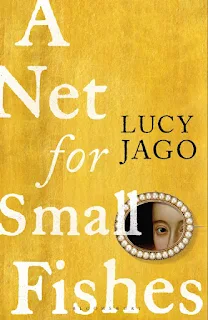Lucy Jago is a new-to-me author, and A Net for Small Fishes begins in London in January 1609 during the reign of King James I, taking us through until the year 1615. Mistress Anne Turner is the wife of a Doctor, and despite all odds, she and Frances Howard, Countess of Essex meet and become friends. The differences between them are many; namely their rank and station in life and the 15 years difference in age. However the friendship between Anne and Frances (Frankie) grows as they each face their unique struggles in life.
Frankie is having problems in the marital bed, and I knew I was in safe hands after reading the advice of Dr Turner to Frances Howard in the form of the following conversation from page 30.
"A wife must not question her husband any more than I may question a King; especially a young husband, in need of the support and obedience of his spouse as he brings to bear his authority over his household. When all is in its proper place, then he will rule with kindness and mercy. I have observed that too lusty a wife can dishearten a husband. Until he sees fit to speak of it to me, I can do nothing to encourage him. However, you are wan. I suspect you are suffering from greensickness, for which I can treat you until such time as it is cured by your husband's seed." Page 30I'd never heard of greensickness, and was eager to learn that it was an iron deficiency or anemia that left female patients with a greenish complexion. Apparently there are many causes of greensickness, but one of the cures was sex, in the belief that a husband's sperm would 'settle the womb'. Unbelievable right?
The story of Anne and Frankie's relationship is author Lucy Jago's attempt at exploring the women behind the very real Overbury scandal in more detail. In fact, the less you know about the real events depicted in the book the better.
Lucy Jago has an evocative writing style, and I loved her turns of phrase, like this one from Page 116:
"...'At this rate, you will soon be an earl,' she finished, with a little laugh that revealed her teeth and attracted the attention of the few who were not already listening to every word, lapping at their flirtation like dogs at the butcher's drain." Page 116Jago's writing brings the period to life on the page, however she also appeals to our basic humanity, like this example from later in the book:
"I pulled threads of memory from my mind, carefully separated each one and laid it with utmost tenderness, like clean clothes, on that child's pile, until I was satisfied I had missed nothing." Page 281Anne is a compelling character and I was completely drawn in by her first person narrative. I was also interested to learn that she was famous for patenting the recipe for saffron yellow starch and introducing yellow ruffs to court. I remember it came as a shock some years ago when I learned that ruffs, cuffs and collars were worn in colours other than white; also being produced in yellow, pink and blue during the starching process. Blue ruffs were outlawed by Queen Elizabeth I before the events in this book take place, but that's another story.
The use of yellow was extremely bold at the time, as yellow previously represented cowardice, envy, jealousy, duplicity and treachery. It's more than fitting then that the cover design for A Net for Small Fishes is a vibrant saffron yellow colour and don't you just love the cover design? The french flaps add a luxurious touch as well.
For some reason, I haven't read many books set in the Jacobean era of 1603-1625, however, it is something I'd like to remedy in the future. Until then, A Net for Small Fishes by Lucy Jago was a rare treat and one I highly recommended.





































Great review Tracey, and ugh.. men!
ReplyDeleteThanks Shelleyrae, I know what you mean! There's a definite lack of female agency corresponding to the time period of the book.
DeleteNot sure I've ever read a book set in that period... Thanks
ReplyDeleteYou're welcome Carole, and if you're going to dip your toe into the Jacobean era, I can highly recommend this one.
DeleteI find this century very interesting and am a big fan of Stella Riley's historical fiction, which I recommend.
ReplyDeleteI always love a good historical fiction recommendation so thanks CLM, I'll go and check out Stella Riley on GoodReads now :-)
DeleteLooking forward to reading this one. Terrific review.
ReplyDeleteThanks, I think you're really going to enjoy this one Theresa. Fingers crossed!
DeleteI haven't read any Jacobean fiction for years! This sounds great.
ReplyDeleteIn that case Marg, I hope you decide to pick this one up. I think it's going to keep popping up in the historical fiction reading challenge this year. It's such a great read.
Delete